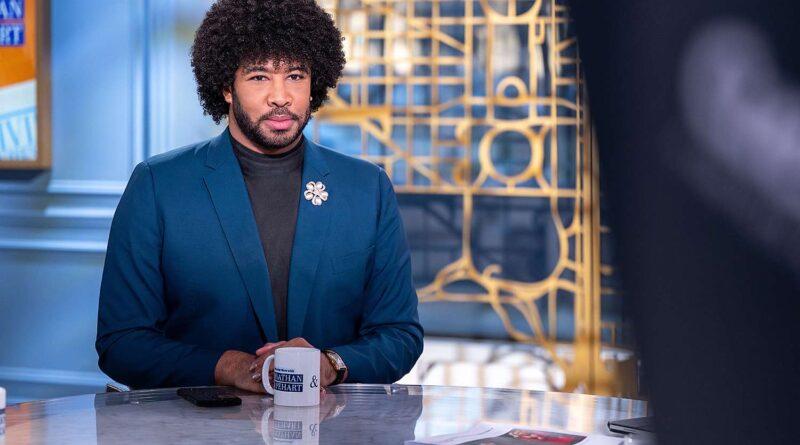Eugene Daniels Critiques Trump’s Governance Style on MSNBC
On a recent Sunday airing of MSNBC, host Eugene Daniels expressed deep disapproval regarding some remarks made by then-President Donald Trump during an interview with The Daily Caller. Trump unabashedly stated that it wouldn’t trouble him to witness arrests of former FBI Director James Comey and ex-CIA Director John Brennan on live television. The conversation with Daily Caller’s White House correspondent, Reagan Reese, took place on a Friday, where Trump asserted his belief that the investigation into the ‘Russiagate’ saga should indeed culminate in detentions.
Daniels articulated his views on his show ‘The Weekend’, where he categorised Trump’s statement as a reflection of an authoritarian tendency. According to him, such behavior – retribution against perceived opponents and favoritism toward followers – was being echoed throughout the federal bureaucracy. Such sentiments were evidently visible in other governmental departments during Trump’s time in office.
Drawing attention to the Centers for Disease Control, Daniels acknowledged Trump’s appointment of his chosen devotee, a business investor devoid of any medical training, to replace a seasoned scientist at the helm of the nation’s leading public health agency. What was concerning wasn’t just the lack of experience of the appointee, but the clear move to install loyalists within critical structures within the federal government.
Daniels did not stop there, however. He highlighted the controversy stirring in the Federal Reserve, where swift hearings were in progress in light of Trump’s bid to unseat Fed Board Governor Lisa Cook. The accusation against Cook was alleged mortgage fraud, although no formal charges were brought against her. Daniels suggested the intent was transparent – pushing Cook to exit to make room for another loyalist.
The accusations focused on Cook’s supposed declaration of multiple properties as her main residence within a short timeframe. The notion itself, even in the absence of charges, appeared to have been leverage in Trump’s effort for a rearrangement in the Federal Reserve.
The host further commented on Trump’s apparent strategy within the government – expelling officials from the CIA, the Department of Transportation, and the Bureau of Labor Statistics. These actions seemed unsettling when considering the prerequisite of political impartiality within these institutions. According to Daniels, impartiality is intrinsic and indispensable for these agencies and their operations.
Daniels also discussed Trump’s increasing conflict with urban centers governed by Democrats, claiming the president was creating a chain of crises in order to consolidate more power. He exemplified this by referring to new threats of immigration crackdowns in Boston and Chicago, involving agents from Immigration and Customs Enforcement (ICE) and Border Patrol, for which the budget was tripled during Trump’s presidency.
Trump publicized on the 11th of August his government’s decision to declare a ‘public safety emergency’, echoing his frustrations with ‘blue cities’. This was followed by the deployment of the National Guard and federal assignment over the Metropolitan Police Department (MPD), marking yet another moment of contention between the federal and local government under Trump’s administration.
The then-Mayor of Washington, D.C., Muriel Bowser, a Democrat, expressed her gratitude in a Wednesday press briefing to ‘the surge of officers’ during Trump’s intense focus on crime. She praised the assistance of the federal officers and credited them for significantly reducing crime in her city.
In her statement, Mayor Bowser underlined the effective collaboration with the Metropolitan Police Department and the federal officials, attributing a whopping 87% decrease in carjackings in Washington, D.C. to their collective efforts during a 20-day period of federal support.
Meanwhile, Director of National Intelligence, Tulsi Gabbard, released documents in July that, according to her, provided conclusive proof that former President Barack Obama and his national security team ‘manufactured and politicized intelligence’ in the wake of Trump’s triumph in the 2016 elections.
These claims made by Gabbard, although substantial if proven, were controversial and were but a piece of the intricate puzzle playing out within the national discourse during that tumultuous political period. Gabbard also referred the alleged case to the Department of Justice.
Daniel’s commentary and analysis on MSNBC illuminated the perceived attempts to foster loyalty within key positions within the government. At the same time, Daniels pointed out the ongoing resistance from Trump’s opposition and the ensuing tension in the political landscape during his administration.
The question over how governance and bureaucratic institutions should balance partisanship and impartiality came to the fore, highlighting the potentially complex and challenging dynamics within federal governance, especially during a period of such intense ideological strife.
Observing from a broader lens, these incidents highlighted the contentious nature of Trump’s administration and raised larger questions of power, loyalty, and the nature of democracy, which were all key issues in political and public discourse at the time.
In sum, Daniels’ analysis of Trump’s controversial comments and governance style offered a window into a period of American politics marked by stark polarization, deep-seated mistrust, and profound concerns over the eradication of institutional impartiality.



